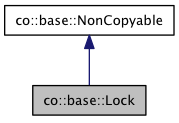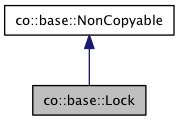A lock (mutex) primitive. More...
#include <lock.h>
 Inheritance diagram for co::base::Lock:
Inheritance diagram for co::base::Lock: Collaboration diagram for co::base::Lock:
Collaboration diagram for co::base::Lock:Public Member Functions | |
| COBASE_API | Lock () |
| Construct a new lock. | |
| COBASE_API | ~Lock () |
| Destruct the lock. | |
| COBASE_API void | set () |
| Acquire the lock. | |
| COBASE_API void | unset () |
| Release the lock. | |
| COBASE_API bool | trySet () |
| Attempt to acquire the lock. | |
| COBASE_API bool | isSet () |
| Test if the lock is set. | |
Detailed Description
Constructor & Destructor Documentation
| COBASE_API co::base::Lock::Lock | ( | ) |
Construct a new lock.
- Version:
- 1.0
| COBASE_API co::base::Lock::~Lock | ( | ) |
Destruct the lock.
- Version:
- 1.0
Member Function Documentation
| COBASE_API bool co::base::Lock::isSet | ( | ) |
Test if the lock is set.
- Returns:
trueif the lock is set,falseif it is not set.
- Version:
- 1.0
| COBASE_API void co::base::Lock::set | ( | ) |
Acquire the lock.
- Version:
- 1.0
Referenced by co::Connection::lockSend().
 Here is the caller graph for this function:
Here is the caller graph for this function:| COBASE_API bool co::base::Lock::trySet | ( | ) |
Attempt to acquire the lock.
This method implements an atomic test-and-set operation.
- Returns:
trueif the lock was set,falseif it was not set.
- Version:
- 1.0
| COBASE_API void co::base::Lock::unset | ( | ) |
Release the lock.
- Version:
- 1.0
Referenced by co::Connection::unlockSend().
 Here is the caller graph for this function:
Here is the caller graph for this function:The documentation for this class was generated from the following file:




 1.2.1 by
1.2.1 by
 1.8.0
1.8.0